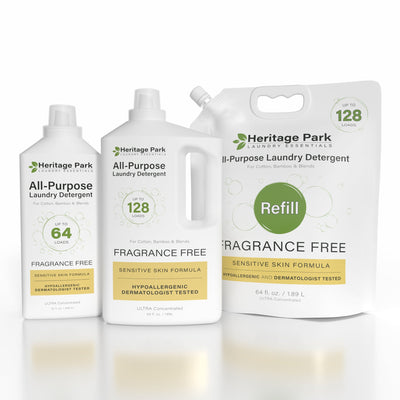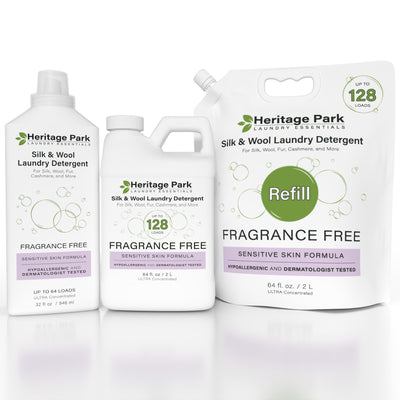This article explains what enzyme laundry detergent is; discusses how it works; and offers recommendations of when and whether to use it on luxury home linen.
Here at Fine Linen and Bath, we make taking care of your luxury home linen a top priority. After all, high-quality bedding, bath towels, and table linen are an investment that will last for years (and possibly even through generations). Proper cleaning and stain removal are essential to helping your luxury linens look, feel, and perform their very best.
That’s why we offer a selection of detergents from premier brands like Le Blanc and Heritage Park Laundry Essentials. These products are specially made to clean fine linen while protecting and preserving the fabric. Today, we’re taking a closer look at Heritage Park All-Purpose Laundry Detergent, this gentle detergent safeguards the integrity of fine fabric while cleaning and tackling stains with its proprietary blend of detergent enzymes. We’re here today to shed some light on laundry enzymes, how they work, when to use them, and when they should be avoided.
Enzyme Detergent: A Special Formula for Cleaning and Stain Removal
Also known as biological detergent, enzyme or enzymatic detergent works by using a combination of different cleaning enzymes, each of which break down a specific category of stain. We always recommend Heritage Park All-Purpose Laundry Detergent, as it is a plant-based enzyme detergent that contains the following proprietary laundry enzyme blend:
- Protease: A protease enzyme targets protein stains such egg and milk; mud or grass stain; meat juices; blood and other body fluid.
- Alpha-amylase: Targets starch stains such as those left by gravy, cereal, or pasta.
- Pectate Lyase: Pectate lyase enzymes attack pectin stains, which are left by fruits and vegetables.
- Lipase: The lipase enzyme targets fats or lipids. Lipase enzymes work on greasy food stains such as butter and oils and on other oil-based stains such as from lipstick or certain cosmetics.
- Mannanase: Attacks sugar used as stabilizer food items such as ketchup and ice cream and personal care products like deodorants, all of which are major stain culprits.
During the wash cycle, these enzymes act as a catalyst for a chemical reaction that breaks down dirt and tough stains so they can be removed by the detergent. Along with the cleaning power of enzymes, Heritage Park All Purpose contains a short list of plant-based cleaning ingredients. It doesn’t contain dyes, sulfates, phosphates, chlorine bleach, or brighteners often found in commercial laundry cleaning products.
This concentrated detergent is pH-neutral, biodegradable, and available in Fragrance Free, Lavendar Mist, Shore Breeze, and Spring Magnolia scents. The fragrance-free formula is lab tested as hypoallergenic to protect sensitive skin from allergies and minimize skin irritation. You can read about Heritage Park’s strict stewardship guidelines here.

When to Use an Enzyme Based Detergent
An enzyme detergent like Heritage Park All Purpose is perfect for regular washing of towels, sheets, table linen, and clothes made from cotton, bamboo, rayon, synthetics, or blends.
“We always encourage our clients to use a detergent made for luxury linen,” says Fine Linen and Bath Brand Manager, Erika Cellupica. “A high-quality enzyme detergent is really ideal for linen that gets used and washed regularly like sheets and towels. Enzymes are a safe and effective way to clean without harsh chemicals that can damage fine fabric.”
Heritage Park All-Purpose Laundry Detergent is concentrated, so you need only a capful or so in the washing machine for each load. You can also mix it with a 1:1 ratio of water in a spray bottle to create an enzyme solution for pre-treating stains; check out our stain removal tips for luxury linens here. Pro tip: always treat a stain quickly, especially a food stain. Intervening sooner than later will prevent stubborn stains from forming. You can also apply Heritage Park All-Purpose Laundry Detergent directly on the stain or use it as a pre-soak. Of course, always read and follow the manufacturer’s directions on the care label before washing.
Check out this blog for detailed care guidelines and cleaning tips for sheets, towels, and more.
When Not to Use an Enzyme or Biological Detergent
Sometimes, enzyme detergent is not the best option for cleaning fabric. As we mentioned earlier, enzyme detergents work by dissolving the individual compounds of stains, especially proteins. Therefore, any fabric that is protein-based -- like silk, wool, cashmere, alpaca, or fur -- should not be regularly laundered with an enzyme detergent. Over time an enzyme detergent can actually degrade the integrity of these fabrics.
As an alternative, we recommend Heritage Park Silk and Wool Detergent when washing silk sheets, washable wool blankets, and other protein-based fabrics. Heritage Park Silk and Wool Detergent contains the same plant-based ingredients in a gentle, pH-neutral formula but is a non biological detergent made without cleaning enzymes; it comes in hypoallergenic fragrance-free as well as Lavender Mist and Spring Magnolia cents.
For detailed instructions on how to wash silk sheets, read this helpful blog.
|
Enzyme Detergent or Biological Detergent |
Non-Enzyme Detergent |
|
Heritage Park All-Purpose Laundry Detergent |
Heritage Park Silk and Wool Detergent |
|
|
|
|
Contains cleaning enzymes to dissolve stains, including protein-based stains in most fabric |
Does not contain enzymes that can damage protein-based fiber |
|
Best for:
|
Best for:
|
Of course, the Fine Linen and Bath Design Team is eager to answer any questions you might have about fabric care or how to choose the best detergent for luxury linen. Feel free to contact us via phone or email – we are here to assist you.













































